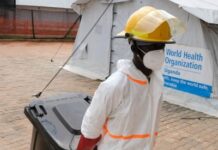Fighting escalated sharply in late January, as Rwanda-backed M23 rebels seized control of parts of North Kivu, including areas near the regional capital Goma, and advanced towards South Kivu.
An IDP camp in eastern DRC hosting tens of thousands of vulnerable families.
Infrastructure hit
The violence has severely damaged essential infrastructure, including water, electricity, and communication networks.
In Goma, water and electricity remain cut off and people are forced to rely on unsafe water, increasing risk of disease outbreaks. Telecommunications (phones) and Internet access is also disrupted.
Public and private property – including WFP and non-governmental organization-run warehouses – have been looted.
“Coupled with severed access to the city, food and other essential supplies are almost depleted,” WFP said, adding that scarcity has driven prices up, making it even harder for vulnerable communities to afford basic necessities.
Hard-won development gains at risk
In addition to threatening the safety and wellbeing of millions, the fighting has put years of hard-won development gains at risk.
Achim Steiner, Administrator of the UN Development Programme (UNDP) underscored that it is not just a humanitarian emergency but a development crisis jeopardizing progress toward the Sustainable Development Goals (SDGs).
“Every day the conflict continues, access to education and healthcare is disrupted, businesses collapse, and vital infrastructure is damaged – deepening hardship for communities and eroding the foundation for long-term recovery, resilience and sustainable development,” he said in a statement on Sunday.
“I call on all actors to prioritize dialogue, uphold international humanitarian law, and pursue a peaceful resolution to this crisis,” he added.





























